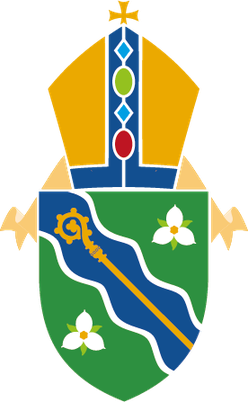Diocese of Niagara | |
|---|---|
 | |
| Location | |
| Country | Canada |
| Ecclesiastical province | Ontario |
| Archdeaconries | 5 |
| Headquarters | Cathedral Place, Hamilton |
| Statistics | |
| Parishes | 79 (2024) |
| Members | 13,745 (2024) |
| Information | |
| Denomination | Anglican Church of Canada |
| Rite | Anglican |
| Established | 1875 |
| Cathedral | Christ's Church Cathedral, Hamilton |
| Current leadership | |
| Bishop | Susan Bell |
| Map | |
 The boundaries of the diocese within the Ecclesiastical Province of Ontario. | |
| Website | |
| niagaraanglican.ca | |
The Diocese of Niagara is one of thirty [1] regional divisions in the Anglican Church of Canada. The see city of the diocese is Hamilton, with the bishop's cathedra located at Christ's Church Cathedral on James Street North. Located within the ecclesiastical province of Ontario, it borders the Dioceses of Huron and Toronto. The area enclosed by the Diocese of Niagara includes much of the Golden Horseshoe, and moves north to include Erin and Orangeville as far as Shelburne. Moving sharply south, the boundary includes Mount Forest and widens, south-westerly to include Elora and Guelph. Skirting Brantford and the Territory of the Six Nations Confederacy, the line then travels, again, south-westerly to Jarvis and Lake Erie to include the entire Niagara Peninsula. Major urban centres within its borders are St. Catharines, Niagara Falls, Hamilton, Guelph, Oakville, Milton, Burlington, and Orangeville.
Contents
- Early history
- Parishes by region
- Region of Greater Wellington
- Region of Trafalgar
- Region of Hamilton-Haldimand
- Region of Lincoln
- Region of Brock
- Educational institutions
- Diocesan bishops of Niagara
- Litigation
- References
- External links
The current bishop of Niagara is Susan Bell, who succeeded Michael Bird as diocesan bishop on June 1, 2018. She was elected bishop by the synod of the Diocese of Niagara in March 2018, and consecrated and installed as bishop in May of that year.
There are just over 80 parishes within the diocese served by approximately 120 licensed parish priests, with a number of honorary clergy, vocational deacons and licensed lay readers. [2] The diocese is divided into five regional deaneries: Brock, Lincoln, Hamilton-Haldimand, Greater Wellington and Trafalgar. Each deanery is overseen by a regional archdeacon and regional dean.

